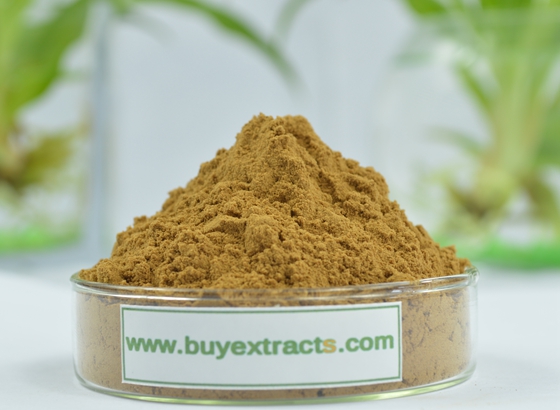Summary: Astragalus root extract and Astragaloside IV have numerous Immunostimulant, anti-microbial, antioxidant, and anti-inflammatory properties. It is used to treat and prevent cardiovascular diseases, boosts the immune system, promotes a healthy nervous system, and enhancing the cellular lifespan.

Astragaloside IV is an important active constituent extracted from the root of Astragalus (Astragalus membranaceus), a plant that has been used in Traditional Chinese Medicine for thousands of years. It is extracted in a highly complex process and concentrated to obtain an active and detectable amount of Astragaloside IV. Astragalus root contains a high concentration of polysaccharides immunostimulants and glycosides; the compounds make Astragalus be regarded as an essential tonic herb, which has been used to support health and extend the lifespan in humans. Also, it has been used to treat a wide range of diseases related to immune deficiency and enhancing the cardioprotective and neuroprotective effect.
Astragaloside IV benefits
Astragaloside IV is a potent anti-aging supplement. Research in the journal of pharmacology (Acta Pharmacologica Sinica) shows that it contains specific ability to activate telomerase, a process that reduces the shortening and degradation of telomeres; the gradual shortening and degradation of telomeres induces cellular ageing and is responsible for the development of age-related diseases; besides, telomere degradation leads to apoptosis, a programmed cell death that causes the different types of cancer. Shortening of telomeres is associated with cellular ageing and the development of age-related diseases.
Astragaloside IV has Immunostimulatory benefits; according to a conducted in Phytotherapy Research, it increases the number of stem cells in the bone marrow and lymphatic tissues and promote them to grow and develop into active immune cells; also, it stimulate the secretion and activation of immunoglobulins and lymphocytes that boost the natural body protective mechanism. Besides, it enhances the production of interleukin 6 and tumour necrosis factor by the macrophages, which promote resistance to the immunosuppressive effects of chemotherapy drugs.
Astragaloside IV contains antiviral properties; a study in the Journal of Pharmacology conducted on the viral effect on myocarditis showed that Astragaloside IV inhibited the replication of coxsackie virus responsible for myocarditis, a condition that lead to the inflammation of the heart muscle.
Astragaloside IV has Anti-inflammatory effects; a molecular-based research conducted using animal models showed that Astragaloside IV has the ability to stimulate the inflammation of the airways in chronic asthma.
Astragaloside IV promotes Cardioprotective and Neuroprotective effects: a publication in the Journal of Chinese Pharmaceutical Sciences stated that Astragaloside IV promotes a healthy heart and nervous system. Thus, it prevents a congestive cardiac failure and angina pectoris. Besides, it protects the nervous system by preventing neurodegenerative diseases. A study conducted on the neuroprotective effect of astragaloside IV showed that it inhibits the degeneration of dopaminergic neurons, a condition that causes Parkinson's disease. The antioxidant property prevents the deterioration of these organs by regulating the oxidative effect of the free radicals on various cardiovascular and neuro-related mechanisms.
Astragaloside IV Recommended dosage
Astragalus root may be taken as tea, tincture or decoction. The recommended dosage of Astragalus Tincture is 3 to 5 ml, three times daily. For Astragalus Decoction, an ideal dosage of 3 to 6 grams of dried root should be taken, 3 times daily. Powdered Astragalus root can also be used at a recommended dosage of 500mg to 1000mg taken as capsules three times daily. Additionally, for Standardized Astragalus extract, 250mg to 500mg three times daily can also be administered.
Astragaloside IV possible side effects
Astragalus is probably safe to use for adults since no severe side effects have been detected. However, high doses might affect the immune system and cause hypoglycemia. Mild side effects may include allergic reactions, skin rash, itching, swelling of the face, dizziness, and difficulty in breathing.
Warnings
Often, Astragalus (Astragalus Membranaceus) can interact with other medication that can result in adverse reactions to the body; some of these interactions can also be life threatening. Astragalus herb and drug interactions include: Immunosuppressants; Astragalus stimulates the immune system and therefore should not be used together with immunosuppressant drugs. Astragalus should not be used together with antihypertensives since it may increase or decrease their action. Besides, Astragalus can increase or decrease the action of drugs such as Interleukin-2. Therefore, patients on medication are always advisable to seek medical guidance before taking any Astragalus products.
References:
- Phytotherapy Research: Review of the botanical characteristics, phytochemistry, and pharmacology of Astragalus membranaceus (Huangqi).
- Medicinal Plant and Natural Product: Astragaloside IV from Astragalus membranaceus shows cardioprotection during myocardial ischemia in vivo and in vitro.
- Journal of Chinese Pharmaceutical Sciences: Cardiovascular protective effects of astragaloside IV.
- Journal of International Medical Research: Effects of Astragalus Polysaccharides and Astragalosides on the Phagocytosis of Mycobacterium tuberculosis by Macrophages.
- Acta Pharmacologica Sinica: Anti-aging effect of astragalosides and its mechanism of action.
- Molecules: Anti-Inflammatory Cycloartane-Type Saponins of Astragalus membranaceus.


